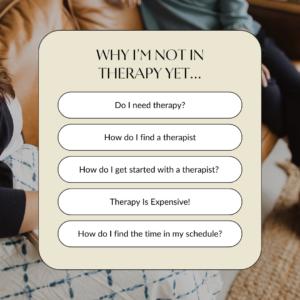Angela Prior
lcsw, ryt, ciec
hey there!
The AP blog is here for all things mental health, embodiment, yoga, and burnout. Poke around and take what you need.
meet angela
Reasons why you may not have started therapy yet…
September 9, 2024
This post originally started Therapy as a social media post and as I was writing it and I when I ran out of characters on IG for the caption I realized that this topic felt important to me and needed a larger word forum to live. So here we go…
I’m going to be really real with you for a moment; it can be really hard to start therapy. There can be a lot of challenges and barriers to it. I am saying this as a therapist of 14 years and as someone who has been in therapy for a lot of years. I consider therapy to be one of my most important self care activities. I don’t want to be a burned crispy therapist sitting with clients holding space from that place, so I go to therapy. I work on my sh*t because we all have some.
I remember the first time I was looking for a therapist and remember feeling so overwhelmed at where to start. I feel I should mention that at this time I myself was a practicing social worker and I still didn’t know how to find someone I would click with. It felt really vulnerable and I know that my experience isn’t that unique.
Here are 5 reasons I have found that are common barriers to starting therapy.

1. I’m not sure if I need therapy?
- I know I’m a therapist which kind of already makes me biased but I think everyone could benefit from talking to someone at some point in their life. Like screw stigma, in my opinion it can go take a flying leap.
- We all go to yearly doctor appointments and check ups; why is mental health any different? If you are a living human you have mental health. Why do we expect our mental health to be great at all times, when we don’t expect that of our physical health? Sometimes we just need a checkup and mental health tune up.
- Sometimes it’s just helpful to talk about stuff
- Learning tools to help you feel more regulated can be really helpful
- If you are thinking about it; then don’t second guess that intuition and go to therapy. Worse case you try it and then decide it’s not for you
So you have now decided to give therapy a go but Google can only take you so far especially when you are looking for someone who is gonna get you, provide the speciality service you are looking for, and have availability…
2. How on earth do I find a therapist?
- #1 option Ask you friends if they love their therapist you might too
- Ask other professionals you may already work with i.e. your dietitian, psychiatrist, doctor, OBGYN PT, OT, Speech therapist, chiropractor, massage therapist, yoga therapist etc…
- Talk with your Pediatrician or school counseling services for referrals
- Social Media- a lot of therapists of some type of presence on social media you can check out the therapy # for your area. For us #dallastherapists or once you have name from google and want to double check it then take to the socials to get a feel for them
- Talk with your Pediatrician or school counseling services for referrals
- Psychology Today: at this point I think its an ok resource it does help you filter but I definitely prefer a referral in to someone personally
- If you know you want to work with someone who does EMDR, Brainspotting, Intuitive Eating or another specialty you can go to those association websites and they usually have a database you can search
- Other search engines like therapy den etc..
- Insurance Co – caveat they don’t always have the most up to date lists on their websites
- Does your company work with a Employee Assistance Program such as Lyra Health
- Are you in college? Contact your schools counseling services
3. Ok, I have a name of a therapist or even a couple names now what??
Most therapists will schedule a phone consultation with you. So go ahead and reach out! If you have a couple names, schedule phone consults with all of them. It’s ok and in my opinion preferred to reach out and interview a couple therapists to help determine if they would be a good fit for you.
I know for me in my phone consultations I let everyone know that this is an opportunity for us to get an idea if we would be a good working fit together. That allows me to learn more about their needs and what they are wanting to work on in therapy. I can share a little bit more in depth about my approach and style. We can discuss fees, scheduling, and I can answer any questions they may have. If they decide they would like to move forward with scheduling a 60 minute initial assessment we would schedule it then. It is not uncommon for someone to let me know they are talking to a few different therapists and I let them know to reach out when they decide.
4. Therapy is really expensive!
Therapy is expensive and depending on your area, therapist speciality focus, and years of experience it can really start to add up.
As a therapist I recognize this and I see the privilege of being able to afford the therapist you would like to work with. I also see the disparity occurring between those who can afford mental health care and those who can not. I do not agree with the disparity happening, I see it as an injustice, and I have personally found operating within the current insurance structure to be unsustainable for me as a therapist, a human with bills, and a business owner. But what the heck do you do to navigate this?
- If you have insurance you can try to find someone contracted with your insurance co.
- Ask about sliding scale spots (most therapists have a limited number of spots)
- If you have an eating disorder you can reach out to Project Heal they partner with therapists and treatment centers who provide pro bono work (our practice is a partner)
- research your out of network benefits (they could be really good) and submit those superbills
- look for financing options (we will be offering financing options soon through Care Credit)
- Look into financial scholarship and vouchers such as @thelovelandfoundation .
- Use your FSA and HSA benefits.
- Work with a student (many practices and counseling offices will have graduate students interning with them providing lower cost or free services).
- If you’re in college look into your Counseling offices on campus.
- You can utilize your Employee Assistance Program
- Explore your community mental health options
- You can build mental health into your budget.
I have found most of the clients our practice works with usually utilize FSA/HSA benefits, out of network benefits, build it into their budget, and we all offer limited sliding scale options.
5. How do you find the time?
It can be hard to find the time in your schedule and manage your work schedule for appointments.
- Look for someone in your state offering telehealth (most of us do!), see who can schedule early morning, lunchtime (that’s me), evening, or weekend appointments.
- If you live in a more rural area and there is a lack of access look for providers in more densely populated areas in your state that provide telehealth.
- Part of your Questions you bring to your consult appointment can be how does the therapist schedule appointments. I often work with individuals who work in healthcare and having a recurring appointment doesn’t always align with their work schedules. We will book out and reserve their appointment spots that work with their schedule they have assigned at the time. I also utilize an online appointment booking system which allows clients to have more control and ability to move their appointments based on their scheduling needs.
- You may be someone who might be a good fit for intensive sessions such as (brainspotting or EMDR). We offer these and they offer a condensed amount of time to do focused deep work. Example: we could book a full day (6 hours) and do some really focused work or even a full weekend. If you live out of state but know you would like directly with us then traveling in for a weekend to make progress on a focused issue may be a good fit for you and be a good use of your time.
There is no perfect solution to any of these barriers that may be keeping you from starting therapy yet. I want to encourage you to just start researching and to keep exploring the options you find in your area until you find the fit for you.

eight free meditations
To Support Your Mental Health
Let's Work Together
Meet Our Team of Therapists + Yoga Instructors